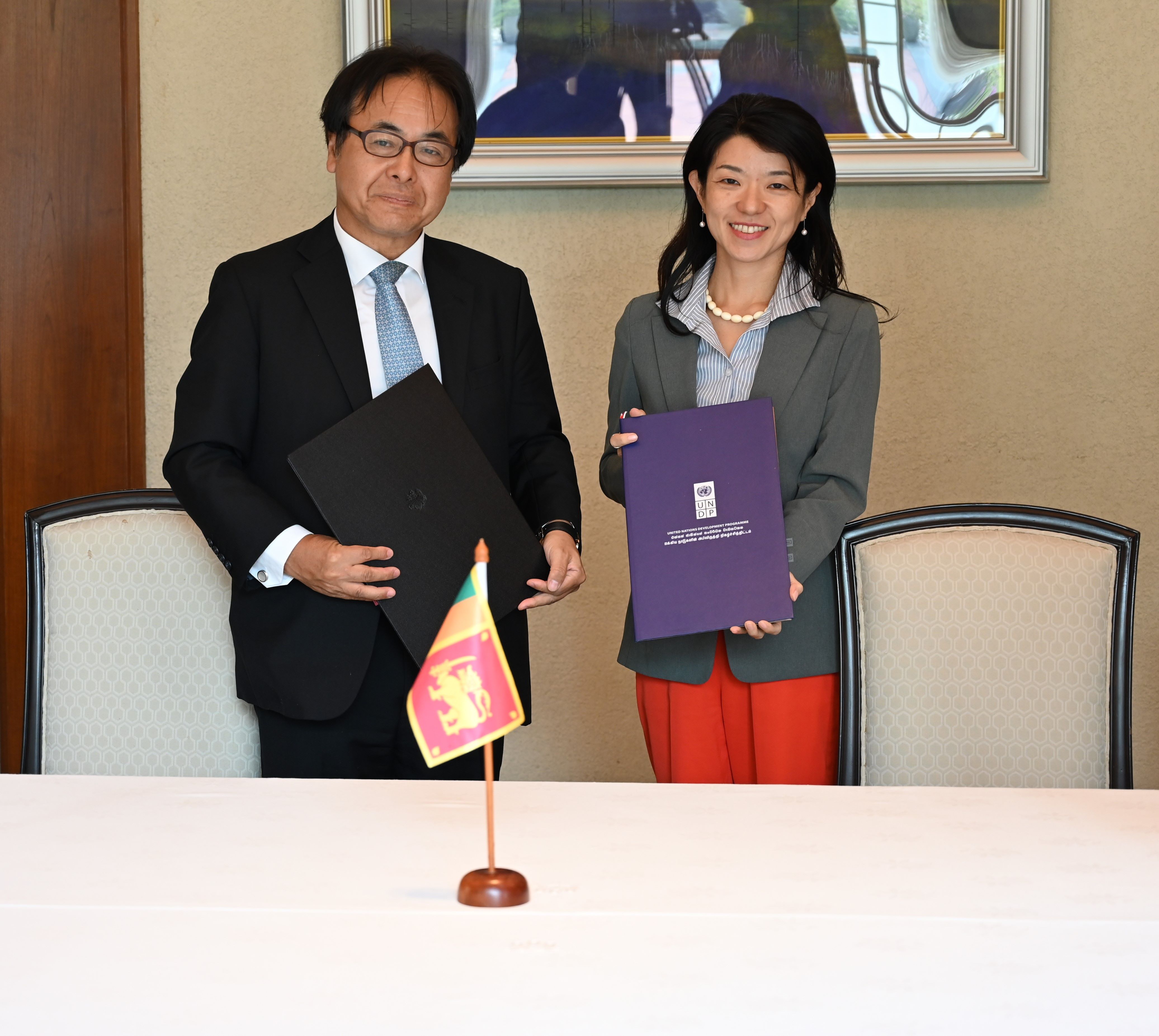Initiative launched towards creating an enabling environment for investment and economic growth
Government of Japan commits to Promoting Economic Governance through Anti-corruption Policy Support in Sri Lanka
February 13, 2024

13 February 2024, Colombo, Sri Lanka: H. E. Mr. MIZUKOSHI Hideaki, Ambassador of Japan to Sri Lanka and Ms. Azusa Kubota, Resident Representative, United Nations Development Programme (UNDP) Sri Lanka, marked the launch of the new project titled ‘The Project for Promoting Economic Governance through Anti-corruption Policy Support’ through an official signing that took place in Colombo today, with the participation of senior government officials.
Sri Lanka’s ongoing socio-economic crisis has reversed development gains achieved, with deep-rooted transparency and accountability gaps identified as a key contributor to the economic crisis of the country. The new project will work towards strengthening the anti-corruption ecosystem in Sri Lanka, through time-bound, costed national policy reform, inter-stakeholder collaboration, and enhanced institutional capacity to deliver a necessary roadmap for the country to emerge from fragility towards a resilient economy and a trusted democracy.
‘The Project for Promoting Economic Governance through Anti-Corruption Policy Support’ is supported by the Government of Japan through the Japanese Supplementary Budget (JSB) of 137 million JPY (approximately 931,000 USD) will be implemented by the Government of Sri Lanka and UNDP in Sri Lanka. The proposed action seeks to (1) strengthen legal and policy frameworks; (2) improve coordination among key institutions combating financial and tax crimes; and (3) enhance strategic institutional and individual skills and capacities around combating anticorruption through strategic action under three main outcomes.
Highlighting Japan’s commitment to support the people of Sri Lanka, H. E. Mr. MIZUKOSHI Hideaki, Ambassador of Japan to Sri Lanka noted, “Anti-corruption measures are conducive for more business friendly environment for foreign investors. Japan would like to support improvement in this sense and expect to see expansion of our business relationship. I would like to affirm once again that the Government of Japan remains dedicated to supporting to promote Sri Lanka’s fairer economic governance and anti-corruption initiatives and we eagerly anticipate witnessing the tangible impact of our collective efforts.”
Targeted, time-bound, capacity development within the anti-corruption ecosystem will assist Sri Lanka to ensure a comprehensive approach to combatting corruption through prevention, investigation, and prosecution. This will contribute towards efficient and predictable public service delivery, upholding the rule of law that serves as a bulwark against corruption and encourage foreign direct investment which is critical to Sri Lanka’s recovery from the socio-economic crisis.
Commenting on the role of UNDP, Ms. Azusa Kubota, Resident Representative for UNDP in Sri Lanka highlighted, "It’s become evident that for Sri Lanka to effectively implement required reforms and restore its economy, accountable and transparent systems and institutions are absolutely essential. This partnership with Japan complements our ongoing and planned activities in support of strengthening economic governance and will promote a holistic approach that empowers institutions to collaborate seamlessly. The JSB support will serve as a catalyst, enhancing not only their individual capacities but, most crucially, their collective ability to unite in the fight against corruption. We in UDNP are deeply grateful to the Government of Japan for this opportunity".
The interventions envisaged under the project will contribute significantly to the achievement of Goal 16 of the Sustainable Development Goals (SDG16), by promoting peaceful and inclusive societies for sustainable development, providing access to justice for all and building effective, accountable and inclusive institutions at all levels.
***

 Locations
Locations